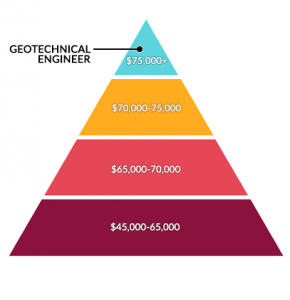Examine This Report on Geotheta
Examine This Report on Geotheta
Blog Article
The Facts About Geotheta Revealed
Table of ContentsIndicators on Geotheta You Need To KnowGeotheta Things To Know Before You BuyGeotheta Fundamentals ExplainedExcitement About GeothetaRumored Buzz on Geotheta

They conduct website investigations, collect examples, do lab tests, and evaluate data to examine the suitability of the ground for building and construction tasks - Geotechnical Engineers. Based upon their findings, geotechnical designers offer suggestions for foundation layout, incline stability, maintaining structures, and reduction of geotechnical hazards. They team up with other experts, such as designers, structural engineers, and building and construction groups, to make certain that geotechnical factors to consider are integrated right into the overall project design and application
By examining the behavior and buildings of soil and rock, they can determine prospective geotechnical risks such as landslides, dirt settlement, or incline instability. Their proficiency helps stop failings or crashes that might endanger lives and home. Right here are some in-depth obligations and obligations of a geotechnical engineer: Site Examination: Geotechnical engineers conduct website examinations to collect information on subsurface conditions.
They analyze the data to comprehend the residential or commercial properties and behavior of the soil and rock, including their stamina, leaks in the structure, compaction features, and groundwater conditions. Geotechnical Analysis and Style: Geotechnical designers examine the information gathered throughout website investigations to evaluate the stability and suitability of the website for construction jobs. They execute geotechnical calculations and modeling to examine variables such as bearing capacity, negotiation, incline stability, side earth pressures, and groundwater flow.
Top Guidelines Of Geotheta
Foundation Style: Geotechnical designers play an essential function in making foundations that can safely support the intended structure. They analyze the soil problems and tons demands to establish the suitable structure type, such as superficial structures (e.g., footings), deep structures (e.g (https://www.producthunt.com/@geotheta1)., piles), or specialized techniques like soil renovation. They think about factors such as negotiation limits, bearing ability, and soil-structure communication to create optimal foundation designs
They assess building strategies, screen site tasks, and perform field assessments to validate that the style recommendations are followed. If unanticipated geotechnical issues occur, they examine the situation and provide recommendations for removal or changes to the design. Risk Evaluation and Reduction: Geotechnical designers assess geotechnical dangers and risks connected with the task website, such as landslides, liquefaction, or dirt disintegration.

Partnership and Communication: Geotechnical designers work closely with other professionals associated with a job, such as architects, architectural designers, and building teams. Effective communication and partnership are vital to incorporate geotechnical factors to consider into the overall task design and construction procedure. Geotechnical designers provide technological knowledge, answer inquiries, and guarantee that geotechnical needs are satisfied.
Facts About Geotheta Uncovered
Below are some kinds of geotechnical designers: Foundation Engineer: Foundation engineers concentrate on designing and analyzing foundations for frameworks. They evaluate the soil conditions, load demands, and site attributes to establish one of the most suitable structure type and layout, such as shallow structures, deep structures, or specialized techniques like heap foundations.
They examine the variables affecting slope security, such as soil properties, groundwater conditions, and incline geometry, and develop methods to avoid incline failings and reduce threats. Earthquake Engineer: Earthquake designers specialize in evaluating and developing structures to withstand seismic forces. They evaluate the seismic threat of a website, examine soil liquefaction possibility, and create seismic layout requirements to make sure the safety and security and resilience of frameworks during earthquakes.
They carry out area testing, gather samples, and examine the gathered data to define the dirt residential or commercial properties, geologic formations, and groundwater problems at a site. Geotechnical Instrumentation Designer: Geotechnical instrumentation designers concentrate on monitoring and determining the actions of dirt, rock, and structures. They set up and maintain instrumentation systems that keep an eye on factors such as soil settlement, groundwater levels, slope activities, and structural variations to analyze efficiency and provide very early cautions of prospective concerns.
Everything about Geotheta
They perform tests such as triaxial tests, combination examinations, straight shear tests, and permeability tests to collect data for geotechnical evaluation and style. Geosynthetics Designer: Geosynthetics designers focus on the layout and application of geosynthetic products, such as geotextiles, geogrids, and geomembranes. They use these materials to improve dirt security, reinforce inclines, give water drainage solutions, and control disintegration.
They tend to be investigatory individuals, which indicates they're intellectual, reflective, and analytical. They are interested, systematic, rational, analytical, and investigate this site rational. Several of them are also social, implying they're kind, generous, cooperative, client, caring, useful, compassionate, sensible, and pleasant. Does this noise like you? Take our totally free profession test to learn if geotechnical designer is just one of your top job matches.
In the workplace atmosphere, geotechnical designers make use of specialized software devices to execute computations, develop designs, and analyze data. They prepare reports, testimonial task specifications, connect with customers and team participants, and coordinate task tasks. The office setting provides a helpful setting for research study, evaluation, and collaboration with various other specialists entailed in the task.
The 8-Minute Rule for Geotheta
They regularly see job websites to carry out website investigations, evaluate geotechnical problems, and collect data for evaluation. These check outs entail taking a trip to various locations, sometimes in remote or tough terrains. Geotechnical engineers might carry out dirt sampling, conduct tests, and screen construction tasks to make sure that the geotechnical facets of the task are being executed appropriately.
Geotechnical designers also function in specialized geotechnical research laboratories. Geotechnical laboratory designers function extensively in these atmospheres, managing screening tools, operating tools, and tape-recording information.
Report this page